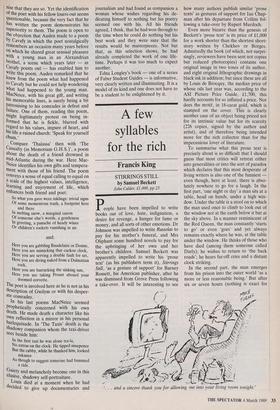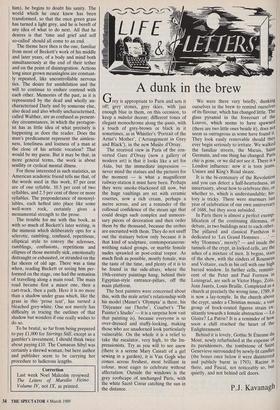A few syllables for the rich
Francis King
STIRRINGS STILL by Samuel Beckett John Calder, 17,000, pp.23 People have been impelled to write books out of love, hate, indignation, a desire for revenge, a hunger for fame or money, and all sorts of other emotions. Dr Johnson was impelled to write Rasselas to pay for his mother's funeral, and Mrs Oliphant some hundred novels to pay for the upbringing of her own and her brother's children. Samuel Beckett was apparently impelled to write his 'prose text' (as his publishers term it), Stirrings Still, 'as a gesture of support' for Barney Rossett, his American publisher, after he was dismissed from Grove Press following a take-over. It will be interesting to see how many authors publish similar 'prose texts' as gestures of support for Ian Chap- man after his departure from Collins fol- lowing a take-over by Rupert Murdoch.
Even more bizarre than the genesis of Beckett's 'prose text' is its price of £1,000 for a work shorter than the shortest short- story written by Chekhov or Borges. Admittedly the book (of which, not surpri- singly, reviewers have been sent not copies but reduced photocopies) contains one original image in two tones of its author, and eight original lithographic drawings in black ink in addition; but since these are all by Louis de Brocquy, the median price of whose oils last year was, according to the ASI Picture Price Guide, £1,700, this hardly accounts for so inflated a price. Nor does the motif, in 18-carat gold, which is stamped on the cover. This is clearly another case of an object being priced not for its intrinsic value but for its scarcity (226 copies, signed by the author and artist), and of therefore being intended more for the rich collector than for the impecunious lover of literature.
To summarise what this prose text is precisely about is so difficult that I should guess that most critics will retreat either into generalities or into the sort of paradox which declares that this most desperate of living writers is also one of the funniest even though, here at least, there is abso- lutely nowhere to go for a laugh. In the first part, 'one night or day' a man sits at a table, head on hands, under a high win- dow. Under the table is a stool on to which the man used once to climb to look out of the window not at the earth below it but at the sky above. In a manner reminiscent of the Red Queen, the man constantly 'starts to go' or even 'goes' and yet always remains exactly where he was, at the table under the window. He thinks of those who have died (among them someone called Darly); he wishes to return to 'the back roads'; he hears far-off cries and a distant clock striking.
In the second part, the man emerges from his prison into the outer world 'as a more or less reasonable being.' But after six or seven hours (nothing is exact for ' . . . and a sincere thank you for allowing me into your living room tonight.' him), he begins to doubt his sanity. The world which he once knew has been transformed, so that the once green grass has turned a light grey, and he is bereft of any idea of what to do next. All that he desires is that 'time and grief and self so-called' should all come to an end.
The theme here then is the one, familiar from most of Beckett's work of his middle and later years, of a body and mind both simultaneously at the end of their tether and on the point of disintegration. Actions long since grown meaningless are constant- ly repeated, like uncontrollable nervous tics. The desire for annihilation and the will to continue to endure contend with each other. Memories of the past, as it is represented by the dead and wholly un- characterised Darly and by someone else, also dead and also wholly uncharacterised, called Walther, are as confused as present- day circumstances, in which the protagon- ist has as little idea of what precisely is happening as does the reader. Does the man's predicament represent the aimless- ness, loneliness and lostness of a man at the close of his artistic vocation? That would be my guess. But it may be that, in more general terms, the work is about senility or cyclical mental illness.
For those interested in such statistics, an American academic friend tells me that, of the words used in this work, 87 per cent are of one syllable, 10.5 per cent of two syllables, and 2.5 per cent of three or more syllables. The preponderance of monosyl- lables, each hefted into place like some well-worn rock, certainly gives a monumental strength to the prose.
The trouble for me with this book, as with so much of Beckett's later writing, is the mimesis which deliberately opts for a sclerotic, rambling, confused, repetitious, elliptical style to convey the scleroses, ramblings, confusions, repetitions and ellipses of those mentally sick, emotionally distraught or exhausted, or stranded on the far shores of old age. There was a time when, reading Beckett or seeing him per- formed on the stage, one had the sensation of travelling along a main road. The main road became first a minor one, then a cart-track, then a path. Here it is no more than a shadow under grass which, like the grass in this 'prose text', has turned a bleached grey-white. One not merely has difficulty in tracing the outlines of that shadow but wonders if one really wishes to do so.
To be brutal, so far from being prepared to pay £1,000 for Stirrings Still, except as a gambler's investment, I should think twice about paying £10. The Cumaean Sibyl was certainly a shrewd woman; but here author and publisher seem to be carrying her procedure to ludicrous lengths.

















































 Previous page
Previous page